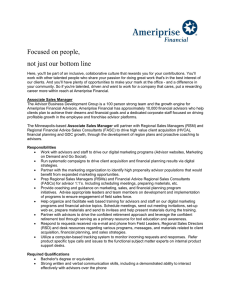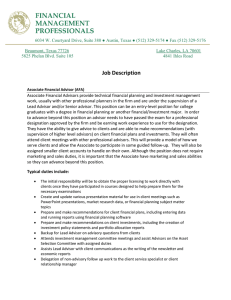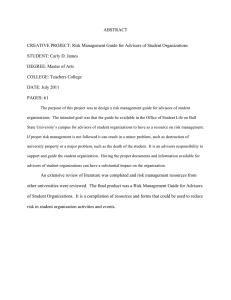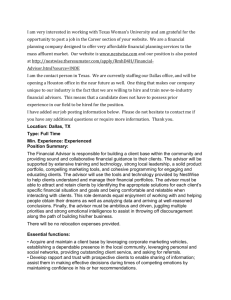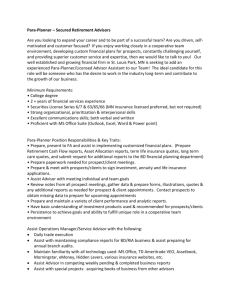Take Special Care with Clients this RRSP Season by Ellen Bessner
advertisement
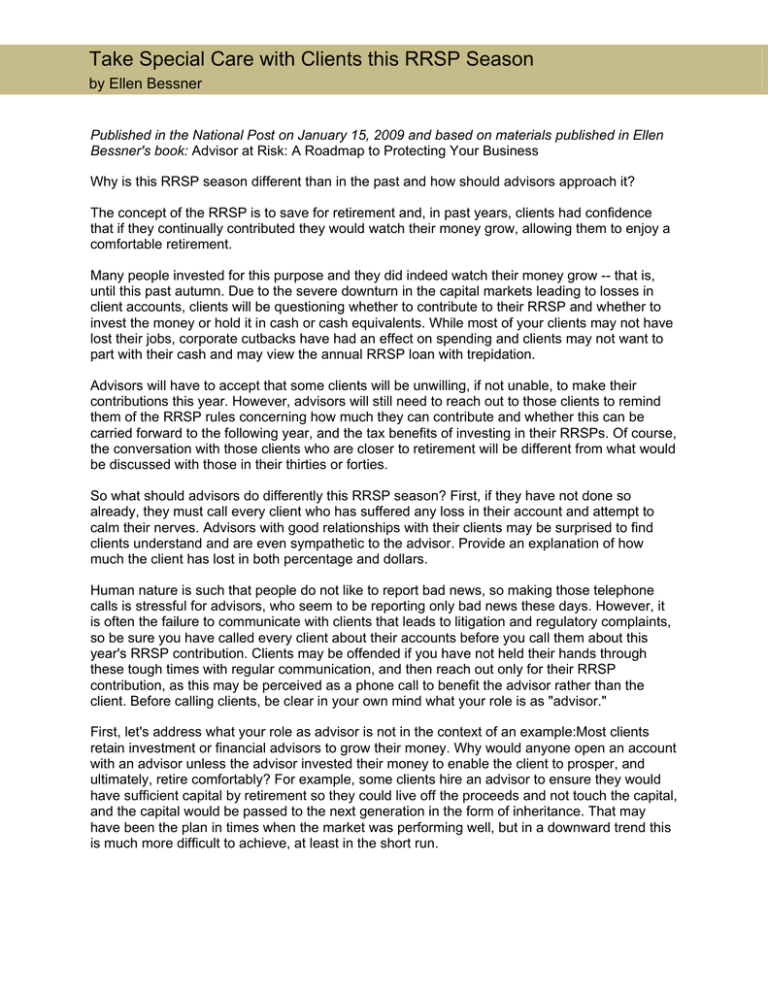
Take Special Care with Clients this RRSP Season by Ellen Bessner Published in the National Post on January 15, 2009 and based on materials published in Ellen Bessner's book: Advisor at Risk: A Roadmap to Protecting Your Business Why is this RRSP season different than in the past and how should advisors approach it? The concept of the RRSP is to save for retirement and, in past years, clients had confidence that if they continually contributed they would watch their money grow, allowing them to enjoy a comfortable retirement. Many people invested for this purpose and they did indeed watch their money grow -- that is, until this past autumn. Due to the severe downturn in the capital markets leading to losses in client accounts, clients will be questioning whether to contribute to their RRSP and whether to invest the money or hold it in cash or cash equivalents. While most of your clients may not have lost their jobs, corporate cutbacks have had an effect on spending and clients may not want to part with their cash and may view the annual RRSP loan with trepidation. Advisors will have to accept that some clients will be unwilling, if not unable, to make their contributions this year. However, advisors will still need to reach out to those clients to remind them of the RRSP rules concerning how much they can contribute and whether this can be carried forward to the following year, and the tax benefits of investing in their RRSPs. Of course, the conversation with those clients who are closer to retirement will be different from what would be discussed with those in their thirties or forties. So what should advisors do differently this RRSP season? First, if they have not done so already, they must call every client who has suffered any loss in their account and attempt to calm their nerves. Advisors with good relationships with their clients may be surprised to find clients understand and are even sympathetic to the advisor. Provide an explanation of how much the client has lost in both percentage and dollars. Human nature is such that people do not like to report bad news, so making those telephone calls is stressful for advisors, who seem to be reporting only bad news these days. However, it is often the failure to communicate with clients that leads to litigation and regulatory complaints, so be sure you have called every client about their accounts before you call them about this year's RRSP contribution. Clients may be offended if you have not held their hands through these tough times with regular communication, and then reach out only for their RRSP contribution, as this may be perceived as a phone call to benefit the advisor rather than the client. Before calling clients, be clear in your own mind what your role is as "advisor." First, let's address what your role as advisor is not in the context of an example:Most clients retain investment or financial advisors to grow their money. Why would anyone open an account with an advisor unless the advisor invested their money to enable the client to prosper, and ultimately, retire comfortably? For example, some clients hire an advisor to ensure they would have sufficient capital by retirement so they could live off the proceeds and not touch the capital, and the capital would be passed to the next generation in the form of inheritance. That may have been the plan in times when the market was performing well, but in a downward trend this is much more difficult to achieve, at least in the short run. -2The problem is that advisors are not guarantors of a positive market and are not guarantors of positive returns. Nor are advisors the watchdogs of their clients' saving, investing or spending. Advisors are, however, experts in the area of investing and markets because they follow the market and they can advise on how the markets have (in the past) performed, who is managing the particular funds, who is managing particular companies, which industries do the analysts and economists predict will grow. They can also advise on different investing options and tax savings such as RRSPs and RESPs. However, advisors must be careful when communicating with clients to clearly explain their role, and this is impossible if the advisor is not clear in his own mind of the limits to his role. An analogy I use in my training courses is the role of other types of advisors, such as lawyers (legal advisors). My clients retain me to advise them on the law and regulations concerning the issue in question. If they express to me that they are retaining me with a guarantee of a positive result, I will send that client away. I cannot accept a retainer from a client who is retaining me as a guarantor of result rather than as a legal/litigation advisor. All advisors -- lawyers, doctors, dentists, financial advisors -- must be wary of clients who have unreasonable expectations that the advisors can magically resolve their problems. While we are experts, we are not magicians. So this RRSP season, manage clients a little differently Be sure that your RRSP contribution telephone call is not the first one you have made to the client since September, 2008, and reinforce your role as advisor, not guarantor or magician.

